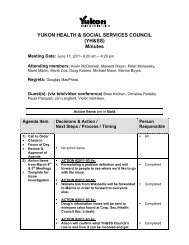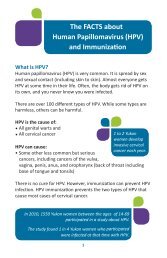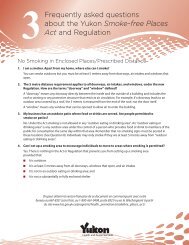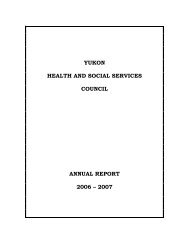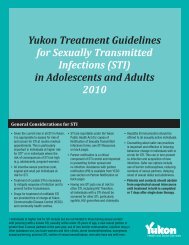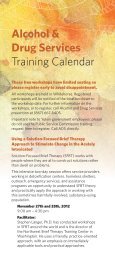NOTES FOR COMPLETION 2 COLUMNS - Health and Social Services
NOTES FOR COMPLETION 2 COLUMNS - Health and Social Services
NOTES FOR COMPLETION 2 COLUMNS - Health and Social Services
You also want an ePaper? Increase the reach of your titles
YUMPU automatically turns print PDFs into web optimized ePapers that Google loves.
ATTACHMENT B – SPECIAL<br />
AUTHORITY TO PROXIES<br />
• This part is optional. If you fill out<br />
this part, you must also have the<br />
Certificate of Legal Consultation<br />
filled out by a lawyer.<br />
• There are certain health care<br />
treatments that your proxy cannot<br />
consent to unless you set these out<br />
specifically in your Directive <strong>and</strong> you<br />
consult with a lawyer. Consulting with<br />
a lawyer is important because the<br />
authority you are providing to your<br />
proxy in these situations may affect<br />
your legal rights.<br />
Authority to restrain<br />
• The authority to restrain <strong>and</strong> treat<br />
you despite your objections may<br />
be particularly useful for people<br />
with mental illnesses who have an<br />
awareness of the cyclical nature of<br />
their illness. Through this Directive,<br />
you can enable family members or<br />
friends to intervene. For example<br />
the proxy could make sure that you<br />
take your medications. This could<br />
make an involuntary admission under<br />
the Mental <strong>Health</strong> Act unnecessary<br />
because you may receive treatment<br />
sooner <strong>and</strong> your proxy can consent<br />
to treatment for you.<br />
• The authority to restrain <strong>and</strong> treat<br />
you despite your objections can<br />
also be useful in situations where<br />
a medical condition can lead to<br />
a build-up of toxins in the body.<br />
These toxins can affect the brain <strong>and</strong><br />
produce confusion. For example,<br />
confusion can be a result of a stroke,<br />
dehydration, seizures, medications,<br />
diabetes or kidney disease.<br />
Capability <strong>and</strong> Consent Board<br />
• Everyone who is assessed to be<br />
incapable of making a care decision<br />
has the right to have that decision<br />
reviewed by the Capability <strong>and</strong><br />
Consent Board under the Care<br />
Consent Act (made up of lay people,<br />
health providers <strong>and</strong> lawyers). In<br />
a situation where a person has<br />
authorized their proxy to restrain <strong>and</strong><br />
treat them despite their objections, the<br />
proxy’s authority could be undermined<br />
if the maker of the Directive objects to<br />
the finding of incapability <strong>and</strong> wants<br />
the Board to review it. It may be<br />
important for the maker to waive this<br />
right in limited situations.<br />
Consent to certain treatments<br />
• The authority to consent to abortion,<br />
ECT, etc. is generally not given to<br />
proxies. These treatments are either<br />
controversial or of questionable<br />
benefit to the person. For this reason,<br />
if you want to give your proxy any<br />
of these authorities, you must mark<br />
it in this section <strong>and</strong> consult with a<br />
lawyer. This might be useful if you<br />
were diagnosed with early Alzheimer’s<br />
Disease <strong>and</strong> your sister was going to<br />
need a kidney transplant eventually.<br />
If you wanted to donate one of your<br />
kidneys to your sister sometime in the<br />
future, you could specify this wish in<br />
your Directive.<br />
6


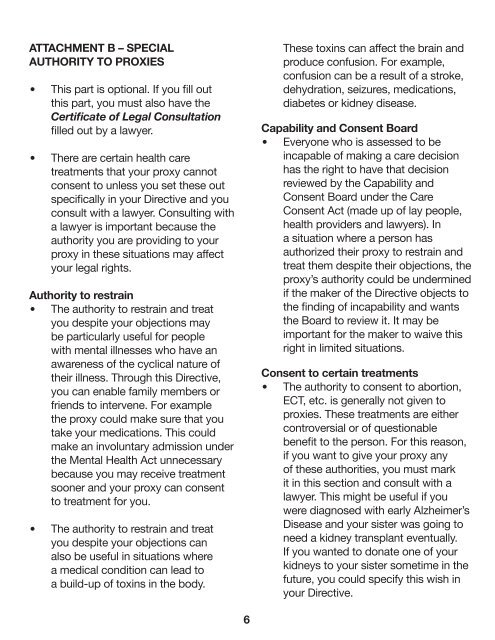

![Women and Alcohol: A women's health resource [2326.26 KB ]](https://img.yumpu.com/22340649/1/190x245/women-and-alcohol-a-womens-health-resource-232626-kb-.jpg?quality=85)

